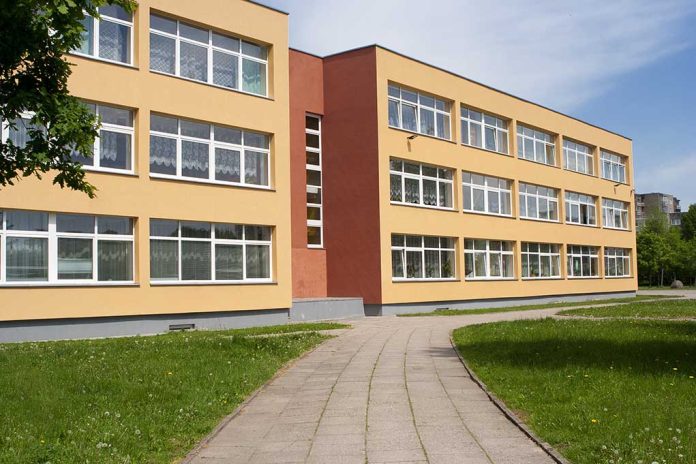
Luther Seminary, a cornerstone of Lutheran theological education for 120 years, will sell its historic $8.7 million campus as student enrollment plummets from 747 to just 183 in two decades.
Key Takeaways
- Luther Seminary’s board has voted to sell its historic 120-year-old St. Paul campus valued at over $8.7 million, planning to relocate to a smaller Minneapolis location by 2027.
- Seminary enrollment has collapsed by over 75% from 747 students in 2003-2004 to merely 183 in 2024, despite offering full scholarships to certain students.
- The Evangelical Lutheran Church in America (ELCA), which Luther Seminary serves, has experienced a devastating 46% membership decline over the past two decades.
- The institution plans to shift to a predominantly online education model, as 70% of current students already primarily engage in online coursework.
- The transition includes laying off 10% of staff while the seminary claims to maintain a strong financial position with $136 million in long-term investments.
Historic Lutheran Institution Abandons Traditional Campus
For over a century, Luther Seminary’s Gothic architecture has stood as a physical representation of Lutheran theological education in America. Now, the institution’s board of directors has decided to “begin the process to shift to a more nimble model and divest from its current physical campus in Saint Paul,” officials announced. The seminary plans to continue operations at its current location through the 2026-2027 academic year before transitioning to a significantly smaller facility in Minneapolis that will accommodate occasional in-person learning sessions.
“It’s a very special place,” Said Lucas Carlson.
The historic campus includes the Old Muskego Church, a chapel originally built in 1844 by Norwegian immigrants and later transported to the seminary grounds. This historic structure, along with the rest of the campus valued at over $8.7 million, will be put on the market as the seminary hopes to find a buyer aligned with community needs, potentially for affordable housing. The sale represents more than just a real estate transaction—it symbolizes the dramatic decline of mainstream Protestant theological education in America.
Enrollment Crisis Reflects Denominational Collapse
The seminary’s decision comes amid catastrophic enrollment declines that mirror the broader collapse of the ELCA’s membership. From a robust student body of 747 in the 2003-2004 academic year, Luther Seminary now serves only 183 students in 2024—a staggering 75% reduction despite offering full scholarships for tuition and fees to many students. This enrollment freefall directly correlates with the ELCA’s denomination-wide membership crisis, which has seen nearly half its members leave in just two decades.
“The way students learn and prepare for ministry has changed. Now is the right time to align our resources with that reality and evolve how we deliver on our mission,” Said Luther Seminary President Robin Steinke.
Despite the dramatic enrollment collapse, Luther Seminary officials maintain they are in a “strong financial position” with long-term investments totaling $136 million. However, the decision to lay off 10% of staff as part of the transition suggests deeper financial concerns about long-term sustainability. The institution claims the shift to a predominantly online education model—with 70% of students already primarily engaging through digital platforms—necessitates less physical infrastructure rather than representing a financial emergency.
Liberal Theology and Declining Cultural Relevance
The ELCA’s progressive theological positions appear to correlate with its rapid membership decline. As one of America’s most left-leaning denominations, the ELCA ordains women and LGBTQIA+ individuals while taking nuanced positions on divisive social issues like abortion and homosexuality. Luther Seminary’s website prominently features a land acknowledgment recognizing indigenous peoples who originally inhabited the seminary’s land, highlighting its embrace of progressive cultural positions.
“We have a chance to renew our commitments to the LGBTQIA+ community, to speak with grace and unity that we are a part of God’s great creation,” Said Elizabeth Eaton.
Luther Seminary’s crisis is not occurring in isolation. Other mainline Protestant theological institutions face similar challenges, with some like the Episcopal Church’s General Theological Seminary shifting to hybrid models or merging with other institutions to remain viable. International students now make up a significant portion of Luther Seminary’s diminished physical campus population, further reflecting changing demographics and cultural shifts away from traditional American Protestantism.
Uncertain Future for Lutheran Theological Education
Despite the dramatic downsizing, seminary leadership insists that its core mission remains essential. “Our mission to educate leaders for Christian communities remains as vital and necessary as ever,” said Luther Seminary President Robin Steinke. Yet the institution’s ability to “remain sustainable over the long term” clearly faces unprecedented challenges as both the seminary and its denomination confront a dramatically changed religious landscape in America.
The sale of this historic campus represents more than just an institutional adjustment—it signals the profound transformation of American religious education in the 21st century. As traditional religious institutions struggle to maintain relevance and enrollment, the future of theological education increasingly appears to be digital, decentralized, and dramatically downsized from the grand physical campuses that once defined American religious higher education.




